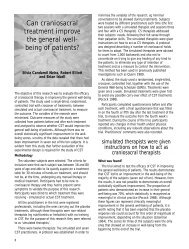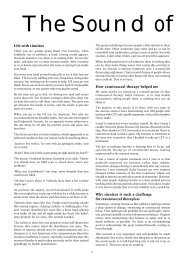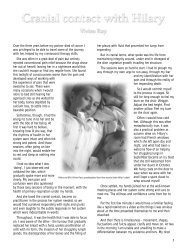Issue 24 2001 real thing.pm6 - The Craniosacral Therapy ...
Issue 24 2001 real thing.pm6 - The Craniosacral Therapy ...
Issue 24 2001 real thing.pm6 - The Craniosacral Therapy ...
You also want an ePaper? Increase the reach of your titles
YUMPU automatically turns print PDFs into web optimized ePapers that Google loves.
and the Cultivation of Equanimity<br />
conditioning that has led you to<br />
that place, just because it doesn’t<br />
give you much space. It usually<br />
means that the client has touched<br />
your history. When it comes to<br />
reactivity, it <strong>real</strong>ly is not about the<br />
client usually, but it is about<br />
your history. It is your difficulty<br />
in being as equally open, equally<br />
present with someone that you<br />
don’t like as with someone that you<br />
do. It is a personal challenge to<br />
you. Working with reactivity is an<br />
important aspect of beginning to<br />
clear the space towards more and<br />
more capacity.<br />
I am a very reactive person - I don’t<br />
know how reactive. Sometimes I<br />
think that other people just hide<br />
it better than I do. When I sit on<br />
meditation retreat, it is reaction<br />
after reaction after reaction, then<br />
a little snooze because I am tired,<br />
and then reaction after reaction,<br />
whether it is a judgement or a<br />
liking or a disliking. It just keeps<br />
turning over. Most of us, if we are<br />
<strong>real</strong>ly honest, are reactive - just<br />
check it out - how are you? Are<br />
you reacting to any<strong>thing</strong>? -<br />
some<strong>thing</strong> that I have said, my<br />
energy, an association? Some<br />
people will be sitting thinking<br />
“Oh, she’s nice, I find what she<br />
says quite interesting”. Other<br />
people will be thinking “Grr, she<br />
said some<strong>thing</strong> I don’t like about<br />
psychotherapy”! We are all<br />
capable of reaction, it is human<br />
and, in its purest form, that energy<br />
is wonderful stuff! But because it<br />
gets distorted and because it<br />
usually gets linked into conceptual<br />
<strong>real</strong>ity which has got no<strong>thing</strong> to<br />
do with what is actually going on<br />
in the moment, it can lead us<br />
towards ignorance. It can lead us<br />
towards making some<strong>thing</strong> of a<br />
situation that it is not and behaving<br />
as though it is <strong>real</strong>.<br />
Reactivity is a very strong way<br />
that we take <strong>thing</strong>s personally.<br />
Reactivity is contagious, as well.<br />
For example, people going around<br />
Photo: © Clare Cherry<br />
gossiping about someone they don’t like in the profession. Of course, that is against our<br />
Code of Ethics but you know...! You don’t like them either and because that energy is very<br />
strong, it is difficult to resist. So the first responsibility we have is to have some practices<br />
to start paying attention to our levels of reactivity and then some ways of working with<br />
reactivity. When you’re reacting, you don’t get a lot of information about the other person;<br />
you can distil it from your reactivity but that takes practice and that takes time.<br />
<strong>The</strong> next level of impact, the middle range of impact, we call response. It is when you are<br />
affected by the other and it impacts on your own experiencing, then there is a response.<br />
Someone comes in and they say, “I am feeling just incredibly anxious, I have been anxious<br />
9





